National Institute of Parasitic Diseases of the Chinese Center for Disease Control and Prevention successfully held the Sixth Virtual Symposium on the Surveillance-Response Systems Leading to Tropical Diseases Eliminating
The National
Institute of Parasitic Disease (NIPD), the Chinese Center for Disease
Control and Prevention (China CDC) (Chinese Center for Tropical Diseases
Research), co-sponsored
with the
Swiss Tropical and Public Health Institute (Swiss TPH) and the World Health
Organization (WHO) held the Sixth
Virtual Symposium on the Surveillance-Response Systems Leading to Tropical
Diseases Elimination (6th SRS)
in Shanghai, on
June 14-15,2022, which attracted more than 600 participants from
53 countries. This symposium was also held to celebrate the 20th anniversary
of China CDC.
Dr. Xiao-Nong Zhou, the Director
of the NIPD,
moderated the opening ceremony. Dr. George Fu Gao, Director general of China
CDC, Dr. Jürg Utzinger, the Director of Swiss
TPH, Dr.
Andrea Bosman, the Director of the WHO Global Malaria Programme, Dr. Gauden
Galea, Representative of WHO China country office, and Dr. Zheng-Long Lei,
Deputy Director General of the Disease Control and Prevention Bureau of
National Health Commission attended the opening ceremony and
delivered welcoming speeches.
Dr. George Fu Gao welcomed the global guests and call for working together to fighting against tropical diseases, and emphasized the importance of the concept of "One World, One Health". As one of the initiators of SRS symposium, Dr. Jürg Utzinger shared the initiation story and achievements since the first SRS symposium in 2012. Dr. Andrea Bosman appreciated that China had achieved WHO’s certification of malaria elimination and expected China could share with endemic countries technologies and experience of malaria elimination. Dr. Gauden Galea stressed that NTDs affect over one billion people globally, and pointed out implementing One Health approaches to prevent and manage these diseases generates momentum for substantial long-term gains. Dr. Lei emphasized Chinas efforts and achievements in the control and elimination of tropical diseases, and wished the symposium becoming a resource-sharing platform to promote technical cooperation in tropical diseases control and elimination among countries.

At the opening ceremony, two books on the Chinas
history of controlling and eliminating schistosomiasis and malaria were also
recommended, titled by "Farewell to the God of Plague: Archives of Fighting
Schistosomiasis in the Peoples Republic of China" and “Accomplishment
of Malaria Elimination in the People’s Republic of China” (Advances in Parasitology Vol. 116), respectively.
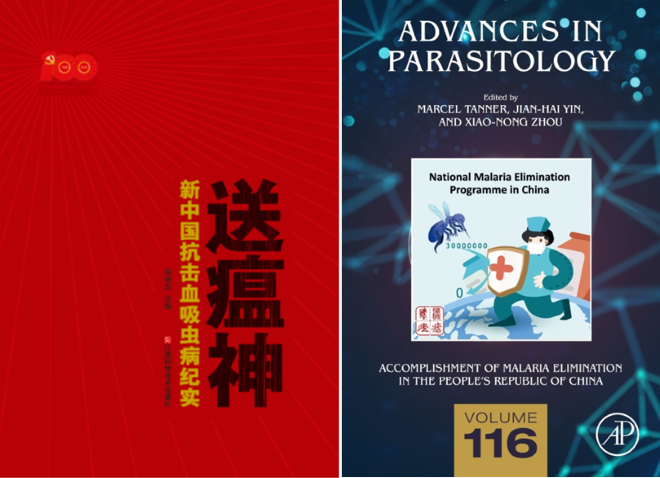
Under the theme of "Mitigate the impact of the COVID-19 pandemic and sustain the goals of the NTD roadmap", four specific forums and two panel discussions were planned to exchange and share the strategies and technologies of tropical diseases control and elimination.
Special
forum Ⅰ focused
on the global strategy and situation
on malaria and NTDs. Dr. Pauline N. Mwinzi, technical officer of SCH & STH
at WHO African region, updated the strategies, progress and challenges on NTDs
in Africa region. Maru Aregawi Weldedawi, technical officer of WHO global
malaria programme demonstrated the strategies and progress of malaria in
Africa. Dr. Amadou Garba, leader of WHO global schistosomiasis control
programme, introduced WHO guideline on control and elimination of human
schistosomiasis.
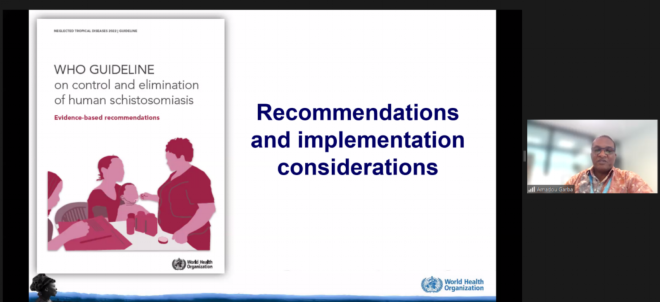
Special forum Ⅱ focused
on the current situation and challenges of tropical diseases control
in country level. Prof. Carlos Graeff-Teixeira of Universidade
Federal do Espírito Santo described
the challenges in tropical diseases control in context of COVID-19 in Brazil.
Dr. Nicholas Midzi, Director
of Zimbabwes National Institute of Health Research, highlighted the latest findings of schistosomiasis
control in Zimbabwe. Dr. Leo Makita, Program Manager of Department of Health in
Papua New Guinea, introduced the progress of the China-Australia-Papua New
Guinea trilateral malaria and health security project.
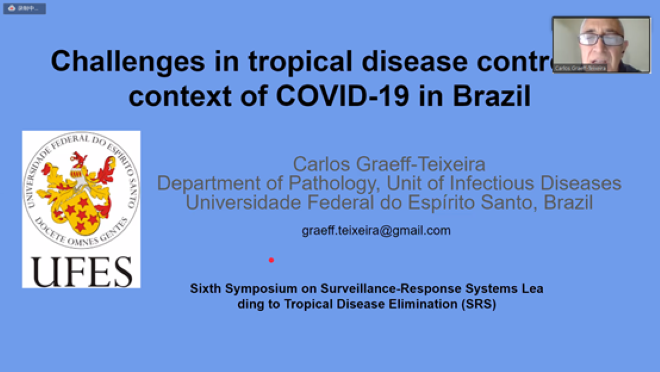
Special
forum Ⅲ
focused on China-Africa cooperation
practice on tropical disease control. Dr.Jun-Ling Sun, Unit
Chief of Parasitic Diseases at the Administrative Division of Infectious
Diseases Control and Prevention, China CDC, shared the information of the Sierra
Leone-China laboratory based surveillance and response of COVID-19 and
hemorrhagic fever. Dr. Wendy Wei, senior
project officer of malaria programme, China Office of Bill & Melinda Gates
Foundation,
introduced their malaria strategy in
China and aspiration for supporting China-Africa
malaria cooperation; Dr. Duo-Quan Wang, Professor of NIPD, shared Chinas
experience in malaria elimination and reflected the China-Tanzania malaria
program.

Special
forum Ⅳ focused
on the One Health approach and innovation technology for tropical
diseases control. Prof. Ji-Ming Liu of Hong Kong Baptist University
introduced Big Data science and Artificial Intelligence technology with their
application in controlling tropical diseases. Dr. Johannes Seiler, Postdoctoral
Fellow of University Innsbruck in Austria, described
a physical distance index to identify high-risk areas of infectious disease
transmission in Africa. Prof. Jakob Zinsstag of Swiss TPH exemplified the
economic evaluation and practice of One Health in tropical disease control. Prof.
Susan Welburn of University of Edinburgh stressed the implementation of One
Health approach in the control of vector-borne tropical diseases.
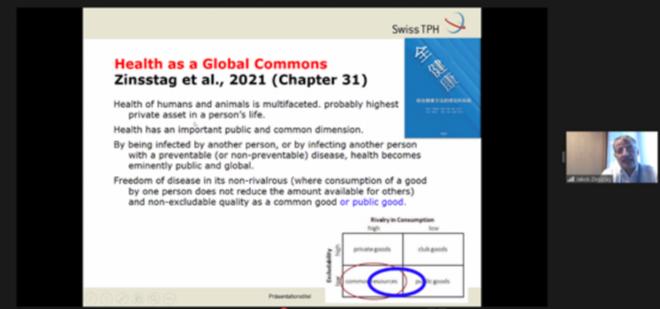
Two panel discussions were hosted during the forums, guests addressed the impact of COVID-19 pandemic to the control and elimination of tropical diseases, exchanged opinions on how to ensure the achieved results of current tropical disease program, and explored innovative technologies to strengthen surveillance and response mechanisms through effective cooperation and constructive partnership.
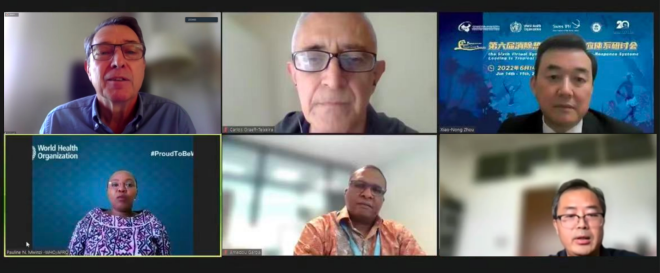
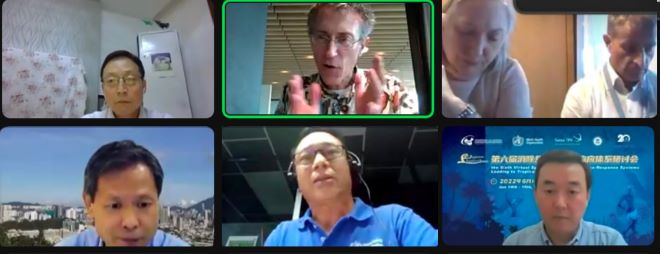
The closing ceremony was co-chaired by Prof. Xiao-Nong
Zhou and Prof. Jürg Utzinger. Prof. Zhou
summarized that 13 speakers shared their experience and impacts of COVID-19 on
tropical diseases control at global, regional and national scales, emphasized
One Health approach, a comprehensive and systematical method via three aspects
including human health, animal health and ecosystem health, gradually developed
into an innovative technology for the surveillance and response of tropical
diseases control, and recommended all partners jointly together to achieve the
goal of tropical disease elimination by following WHO’s malaria strategy and
NTDs roadmap.
The SRS symposia:
SRS symposium is
a biannual international conference co-sponsored
by the National Institute of Parasitic Diseases at the Chinese Center for
Disease Control and Prevention, the Swiss Tropical and Public Health Institute,
and the World Health Organization. The 1st SRS Symposium was held in Shanghai in June 2012.
Subsequently, every second year, the SRS was conducted in Shanghai. In 2020,
due to the COVID-19 pandemic, the 5th SRS Symposium was held virtually, as well as the
current 6th SRS in 2022.
The past SRS symposia yielded fruitful results, such as construct an exchange platform for promoting global tropical diseases control, transmit the demonstration of Chinese experience on malaria and schistosomiasis control and elimination in Asian and African countries, and formed a series of institutional networks on malaria and schistosomiasis and the Belt and Road network on echinococcosis and cysticercosis. The SRS symposia also strengthen communication, collaboration and coordination of the Regional Network on Asian Schistosomiasis and Other Helminth Zoonoses.

